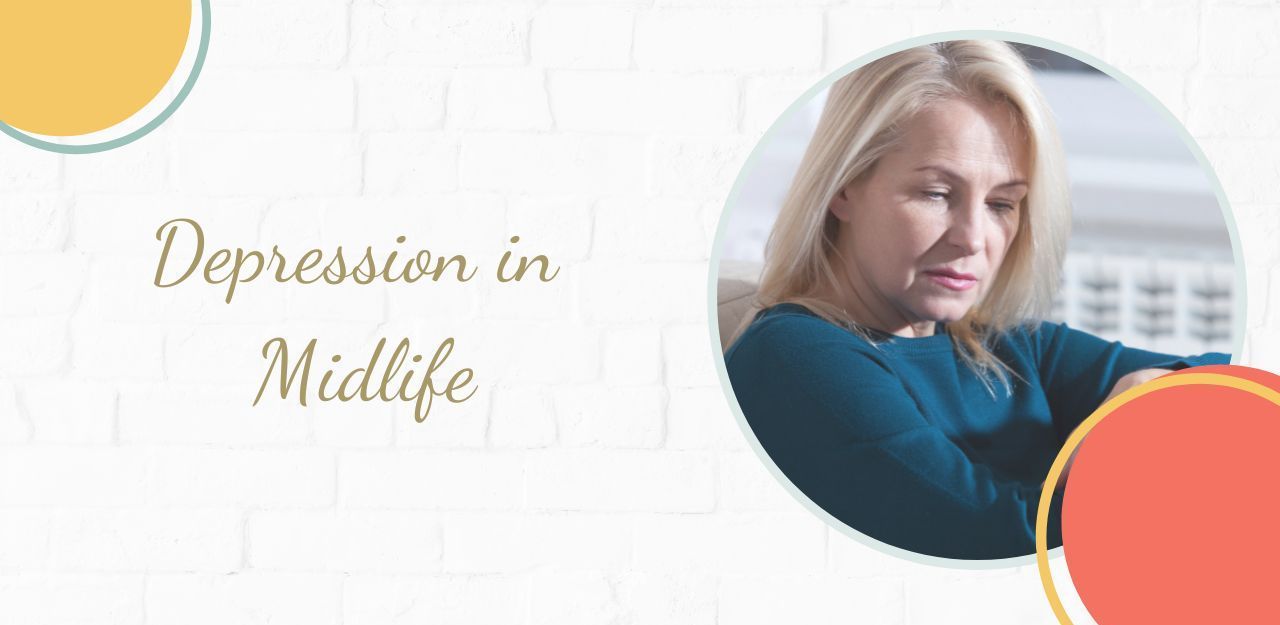Depression in midlife
Posted on 13th April 2023 at 00:10
I'm fine, thanks. That's what we say, isn't it, when asked how are you? I'm fine, thanks. But what if you're not? What if you are sinking, struggling, not fine at all?
Talking about depression in midlife seems to be one of the last taboos. Yet the drop in oestrogen levels that we all experience through perimenopause can trigger depressive symptoms even in a woman who has never been depressed before. It is a logical explanation when you consider the fact that we have oestrogen receptors in the brain as well as the joints and reproductive organs.
At its extreme, midlife depression can escalate so that a woman experiences suicidal thoughts for the first time. Across the western world, the highest suicide rate in women is in the age group from 48-54 - prime perimenopause years. In the UK, in 2021 women aged 45-49 were the most vulnerable. The figures are way below those for men, but no one wants to talk about Mum not wanting to go on, do they? Or women who have climbed the business ladder and smashed the glass ceiling suddenly finding themselves unable to decide between two brands of beans in the supermarket.

If you are feeling suicidal, please pick up the phone:
UK Samaritans - call 11 6 123
US Samaritans - call 988
Australia Lifeline - call 13 11 14
My Experience
I live a fairly public life insofar as I have written about myself on blogs and in books, I show up regularly on Facebook live videos, on Youtube and on the Midlife and Beyond Podcast. Most people know me as optimistic, generally happy, always smiling.
If you follow my output regularly, though, you will know that I have had my battles with anxiety and depression throughout my life at various points. Although I never made plans to "end it all", I went through several months when my overriding feeling when I woke up in the morning was disappointment and dread, swiftly followed by overwhelming guilt and shame - I had (and have) a good life and people who love me and I am immensely grateful for that. But the black clouds of depression rolling in don't discriminate and don't take life circumstances into account. For me, the guilt exacerbated the depression and was one of the hardest things to deal with.
I always know when I'm starting to "slide". There are warning signs that I dare not ignore. These include:
Staying up late into the night, usually working to distract myself
Not wanting to get up in the morning (and not just because I'm tired after staying up late!)
I don't want to shower (I do - I promise!)
I don't want to talk to people
I put off returning messages, or making phone calls
I feel as if I need to stay very still - even a walk to the post box and back feels like too much activity
I stop eating healthily
I can't be bothered to take my supplements
In other words, all the things I usually do as a matter of course that help to keep me mentally healthy are the first casualty when my mood dips. Exercise, good nutrition, general self care, connection with other people - all go out of the window.
That last is important. If you've never struggled with depression yourself it is probably difficult to understand why someone who is feeling low doesn't reach out and ask for help. Because, for me at least, that is what I need.
I need someone to say to me, come on, let's go for a walk in the sunshine. I need three healthy meals a day to be put in front of me. In other words, I need someone to step in and look after me when I am incapable of looking after myself.
I need someone to encourage me to talk, but also to just be there with me. I don't need to be fixed, or jollied along. Because it will pass, as it always does (even though when it settles over me, I always think that this is IT - how I will be forever!)
So why don't I simply ask for help? People think that depression means you feel extremely sad. In my experience, as I slide into it, I feel as if I am shrinking as an invisible wall grows up between me and other people. I don't feel sad, I feel helpless. And hopeless. And scared. If it takes hold, I feel very little at all and it is this absence of feeling that traps me in inertia.
When my daughter lived at home for a short spell, she would notice the signs and make me go out with her. Sometimes, that's all it takes. My son is good at spotting the signs and making time to talk with me. The best thing, though, is if I can catch myself early and change my state.
How do I do that? Sometimes I sleep. I listen to my body and stay very still if that's what it craves. I eat the simple carbs, soak in the bath (much more nurturing than a shower!) read a book, watch the clouds scud across the sky...

Because the worst thing I can do is try to carry on as normal. That is a form of self harm for me. Most things you "have" to do can wait for a day or two. It's worth some temporary inconvenience - to others as well as to yourself - to head off what could turn into months of mental illness.
So if I appear occasionally to "disappear" for a few days, know that I am doing what I need to do to stay well and, ultimately, happy. I can't afford to beat myself up because I'm not being consistent every single day. We all operate in different ways and you know what? That's ok.
Why am I telling you this?
I'm telling you because I want you to know, if you suffer the way I do at times, that you are not alone. That the happiest looking people sometimes have secret battles that you would never guess at. And I want you to remember something we all know in more rational moments - that what you see on social media is an edited version of life.
Life is messy and sad and uplifting and wonderful... but always worth living.
Are you supporting a loved one with depression? This blog post: 7 Ways to Support Someone who is depressed might help. And if you'd like to find out more about how I wrote my way out of midlife depression here: A Journey from Fearful to Fabulous (Sometimes)
The Midlife Movement can help you embrace your middle years and beyond with less stress and more joy! How?
Subscribe to Jo's Newsletter - never miss another blog!
Tagged as: Health, Mental Health
Share this post:







